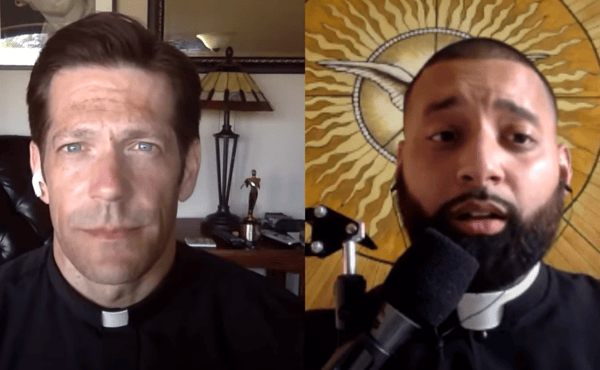What Does Jesus Say About Racism?
Our world was turned upside down when George Floyd died while being held down by a policeman. It brought to light something that is not always talked about: one of the remaining tragedies and evils of our time is the persistence of racism and discrimination.
Some more than others, we all feel the weight of this tragedy with a heavy heart. At its heart, discrimination is a lack of love for our neighbour, negating God’s very claim that all human beings are created in His image and likeness.
Again and again, Jesus showed us what this looks like in life. What’s so radical about his example is that he went against established norms and cultural customs that were grounded in a lack of love for the marginalized: the sick, women, spiritually possessed, sinful, Samaritans, etc. He opposed structures of discrimination by loving every single person with whom he came in contact—affirming their inherent dignity and worth in the eyes of the Father.
For instance, He defied Jewish rules prohibiting interaction with lepers, who were seen as unclean and cast out, willingly spending time with them to bring healing and forgiveness to their suffering and sickness. He spoke to women often, ignoring gender customs that told him not to approach them. A famous example of this is his speaking— and sharing the good news of the water of “eternal life”— with the Samaritan woman at the well (John 4:14). Not only was it against the custom for a man to speak to a woman in this manner, but she was also a Samaritan: a cultural “outsider.”
Jesus loved people with no limitations, boundaries, or exceptions. He would even elevate them in order to make an example of how truly important it was to love your neighbour.
Loving one’s neighbour always extends to those beyond the limited walls of one’s immediate community, race, or background. In the Parable of the Good Samaritan, Jesus elevated someone of the Jewish community who was the time considered a cultural outsider, as an exemplar of how to truly love one’s neighbour.
So what does that mean for us today?
In one sense, this parable uproots the notion that our “neighbours” can ever be limited. It is not just those who are physically next door to us; nor is it limited by their skin colour, gender, class, or some other factor to distinguish certain people from others.
We are neighbours by virtue of being human beings made in God’s image and likeness. Jesus’s words are clear—those who love others regardless of class, religion, race, or gender are following the will of God.
For this reason, the Church has always taught us, “Every form of social or cultural discrimination in fundamental personal rights on the grounds of sex, race, colour, social conditions, language, or religion must be curbed and eradicated as incompatible with God’s design” (CCC# 1953).
“God’s design” is ultimately the New Creation brought about by Christ’s death and resurrection, one made of those “from every nation, tribe, people, and language” (Rev. 7:9). As members of Christ’s Church, we are called to gather and unite, not scatter and splinter, in preparation for God’s wonderfully diverse Kingdom of Heaven.
This is why Archbishop J. Michael Miller wrote in his recent letter on racism that we must “work with vigour and courage to end racism by fostering structures and policies of economic and social justice.”
Yet, true and lasting societal change begins with an individual conversion of heart. As Archbishop Miller also said, “what is needed is a genuine interior conversion—the long road of a conversion that will compel personal change and systemic social reform.”
Saint John Paul II also cautioned us, “unless we follow this spiritual path, external structures of communion will serve very little purpose” (Novo Millennio Ineunte). His point, of course, isn’t that we shouldn’t strive for political and social change that brings about a just world for people of colour and others suffering from discrimination. Rather, it must start first with our hearts.
We must ask for God’s grace to be able to truly love others. It’s not enough to love abstract groups or classes of people. We must love concrete individuals in our midst. As Jesus did, we must seek to form individual relationships of love, understanding, and compassion by praying for the grace to see others as God’s beloved creatures.
Saint John Paul II referred to this as a “spirituality of communion” which he defined it in his Novo Millennio Ineunte as the following: “A spirituality of communion implies the ability to see what is positive in others, to welcome it and prize it as a gift from God: not only as a gift for the brother or sister who has received it directly but also as a ‘gift for me.’”
This is why racism can only be eradicated by coming to understand the infinite value of each and every single person—by seeing with the eyes of God that every person is a gift.
Racism, aside from the grave hurt it can cause to the victim, gravely hurts the perpetrator as well. It blinds us to the gift of others’ diversity: the unique and beautiful way a person represents an aspect of God’s being.
But how do we adopt this “spirituality of communion” with others? The simple answer: by doing what Jesus did. By making one-on-one connections with others—especially those who are marginalized and unjustly treated—and seeking to serve, know, and love them.
It is hard and uncomfortable at times. This is why I’m so grateful we have an example to follow and a God to lean on in the process. We find the strength to do this by asking God in prayer to give us new hearts and eyes capable of seeing the giftedness and wonder of each and every person we encounter.
Through Christ, we can work toward a world that is free of racism, sexism and every other form of discrimination. We can work toward the world that Dr. Martin Luther King, Jr. envisioned, where “all of God's children, black men and white men, Jews and Gentiles, Protestants and Catholics, will be able to join hands and sing.”
Want to learn more about this topic? Check out more of our resources below.

